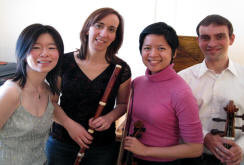 Ensemble Leonarda (Susan Graham, flute; Rebecca Tinio, violin; David Himmelheber
and Anneke Schaul-Yoder, cello; Nancy Kito, harpsichord) started at the Peabody
Conservatory of Music, where its founding members were participating in the
early music program. Named after the composer Isabella Leonarda
(1620-1704), this group of gifted individuals came together to form an ensemble
dedicated to performing works of the Baroque masters with vim, vigor and
enthusiasm. Past performances have included recitals at the Church of the
Epiphany as part of the Washington Musicians for Nuclear Disarmament series;
Squires Recital Salon at Virginia Tech; St. Peter's Lutheran Church, St. Paul's
Chapel--Columbia University, the Donnell Library Center, Music in Chelsea, the
United Pugliesi Federation, Church of the Transfiguration, and most recently,
the Midtown Concerts series.
Ensemble Leonarda (Susan Graham, flute; Rebecca Tinio, violin; David Himmelheber
and Anneke Schaul-Yoder, cello; Nancy Kito, harpsichord) started at the Peabody
Conservatory of Music, where its founding members were participating in the
early music program. Named after the composer Isabella Leonarda
(1620-1704), this group of gifted individuals came together to form an ensemble
dedicated to performing works of the Baroque masters with vim, vigor and
enthusiasm. Past performances have included recitals at the Church of the
Epiphany as part of the Washington Musicians for Nuclear Disarmament series;
Squires Recital Salon at Virginia Tech; St. Peter's Lutheran Church, St. Paul's
Chapel--Columbia University, the Donnell Library Center, Music in Chelsea, the
United Pugliesi Federation, Church of the Transfiguration, and most recently,
the Midtown Concerts series.
This season, the ensemble will explore the world of French Baroque cantatas and the stories of love both won and lost. Their season comprises three concerts, each one built around a French cantata of love gone wrong, and will culminate in a Fringe Concert at the Boston Early Music Festival. Their opening concert, on October 24, 2010 at 4:00 PM at the French Church du St. Esprit, 109 East 60th Street, New York City, will feature Clerambault's cantata Orpheus with tenor David Bell. Tickets are $20; students and seniors $15. For further information about this concert and the rest of their season, please visit www.myspace.com/ensembleleonarda.
Harpsichordist Nancy Kito was
interviewed recently by Casey Ann Reinke.
Casey Ann Reinke: Explain how your upcoming season, "Love's Labour's Lost," came
about.
Nancy Kito: We did a concert a few years ago featuring Clerambault's Orpheus. Michele Cabrini, a friend of ours who is assistant professor of music history at CUNY-Hunter College, was telling me that he was working on a new edition of the cantatas of Philippe Courbois. Michele's specialty is the 18th-century French cantata. The cantate française alternated recitatives with arias, and the instrumentation was a modest symphonie consisting of flute, violin and continuo, although larger ensembles were also used. Our ensemble has exactly that instrumentation. So I thought, well, he has the music history background and we have exactly those forces at hand, let's collaborate!
There will be three concerts, each featuring a cantata, and then we will perform one or two of the Courbois cantatas, collaborating with Michele, in Boston. Some of the Courbois cantatas have not been performed in modern times, so it will be a modern "premiere."
We are also excited to be working with three great singers (all graduates of Peabody Conservatory, by the way): David Bell, tenor; Sorab Wadia, tenor; and Alison Davy, soprano.
Casey Ann: Tell us about French cantatas.
Nancy: Cantatas came to France by way of Italy, around the mid-1600s. You know, there's always been this mutual fascination between the French and the Italians, it's not just Philippe Noiret starring in Cinema Paradiso, and Francois Perier being in Fellini's Nights of Cabiria. The father of French opera, Jean-Baptiste Lully (1632-1687), was a Florentine by birth. François Couperin published some of his works under the Italian-sounding pen name of Francesco Coperuni, and Leclair studied violin in Italy and was dubbed the "Corelli of France." Cantatas gained in popularity as the Lully-style operas declined. Cantatas could be performed with less people (no ballets) and they were a little more accessible because you didn't have to go to the royal court to hear them, the salons were becoming quite popular, and the cantatas suited the more intimate salon atmosphere. The French tried synthesizing the French and Italian styles, one sees this in Couperin's attempt at this in his Les Gouts Réunis.
Casey Ann: What about this season's theme, "Love's Labour's Lost"?
Nancy: Well, each cantata is the story of great passion and great loss. Clerambault's Orpheus (Orpheus loses girl, journeys to the underworld and persuades Pluto to allow him to bring back his beloved Eurydice, but boy loses girl, although this cantata ends before we get to that bit), Clerambault's Leander and Hero (girl loves boy, boy gets girl by swimming to her, girl loses boy, girl loses love and life), and Thomas Bourgeois' Phaedra and Hippolytus (Phaedra falls in love with her stepson and tragedy ensues). We haven't yet chosen the Courbois cantata, but you can be sure of a dramatic story!
Casey Ann: So you're saying that great passion plus great loss, equals great drama?
Nancy: If you think about it, no truly great love story ends happily. Romeo and Juliet? would they be immortalized if they had gotten married, had three kids and lived to a ripe old age in a palazzo in Verona? Dido and Aeneas? If she had nothing to lament about, she'd just be another Queen of Carthage. The Six Wives of Henry VIII? It's Anne Boleyn you remember, not Katherine Parr!
Casey Ann Reinke is a pianist and freelance writer in New York City.
